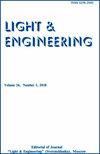选择一种近似彩色led光谱分布的方法并比较它们在标称模式下的参数和特性
IF 0.3
4区 工程技术
Q4 ENGINEERING, ELECTRICAL & ELECTRONIC
引用次数: 0
摘要
新技术和新光源使得在照明设备的设计和建造中创造全新的方法成为可能。发光二极管(led)是一种相对较新的、有前途的节能光源,具有寿命长、发光效率高、美观、环保、可靠、耐用以及容易产生各种光谱的可能性等特点。在照明器件开发过程中,可以方便地使用产品组成中所用led的光谱分布的数学近似来计算器件在可见范围内的最终光谱。这些计算方法在建筑照明中特别有趣。它们也适用于现代LED温室辐射器的开发。本文考虑了近似彩色led发射光谱的两种主要方法:对称分布和非对称分布。基于彩色led的照明设备设计中使用的四种主要类型的led的光谱分布在100 mA到1000 mA的宽电流范围内测量:红色,琥珀色,绿色和蓝色。结果还与考虑二维态密度和LED异质结构有源区的潜在波动的模型进行了比较。在实测计算的基础上,确定了利用LED辐射非对称光谱分布的最优逼近方法。本文章由计算机程序翻译,如有差异,请以英文原文为准。
Choosing a Method for Approximating the Spectral Distribution of Colour LEDs and Comparing their Parameters and Characteristics in Nominal Mode
New technologies and new light sources make it possible to create fundamentally new approaches in the design and construction of lighting devices. Light emitting diodes (LEDs) are a relatively new, promising and energy-efficient light source with a few unique properties: long lifetime, high luminous efficiency, aesthetics, environmental friendliness, reliability, high durability, and possibility to create a variety of spectra easily. During the lighting devices development, it is convenient to use mathematical approximations of the spectral distributions of the used LEDs in the composition of the product to calculate the final spectrum of the device in the visible range. These calculation methods are particularly interesting in architectural lighting. They are also applicable to the development of modern LED greenhouse irradiators. The article considers two main methods for approximating the emission spectra of colour LEDs: via symmetric and asymmetric distribution. The spectral distributions of four main types of LEDs that are used in the lighting devices design based on colour LEDs were measured in a wide range of currents from 100 mA to 1000 mA: red, amber, green, and blue. The results were also compared with a model that considers the two-dimensional density of states and potential fluctuations in the active region of the heterostructure of LED. Based on the carried-out measurements and calculations, the optimal approximation method via the asymmetric spectral distribution of LED radiation was determined.
求助全文
通过发布文献求助,成功后即可免费获取论文全文。
去求助
来源期刊

Light & Engineering
ENGINEERING, ELECTRICAL & ELECTRONIC-OPTICS
CiteScore
1.00
自引率
50.00%
发文量
0
审稿时长
1 months
期刊介绍:
Our magazine
develops comprehensive communication within the lighting community, providing opportunities for discussion and free expression of opinions of specialists of different profiles;
contributes to the convergence of science and engineering practice, the search for opportunities for the application of research results in lighting and technological applications of light;
keeps the scientific community up to date with the latest advances in the theory of the light field, providing readers with operational professional information;
initiates international cooperation, promotes and distributes the results of Russian authors in the international professional community;
provides equal opportunities for authors from different regions of Russia and other countries.
The journal publishes articles in the following areas:
visual and non-visual effects of radiation on humans;
light field theory;
photometry and colorimetry;
sources of light;
ballasts;
light devices, their design and production technology;
lighting and irradiation installation;
light signaling;
methods of mathematical modeling of light devices and installations;
problems of energy saving in lighting, installation and operation of lighting installations;
modern production technologies of lighting products for lighting control systems;
innovative design solutions;
innovations in lighting and lighting design;
the study of the effect on plants and animals, problems of using light in medicine;
problems of disinfection of premises, water and smell elimination with the help of technology of UV radiation using;
problems of light in the ocean and space.
 求助内容:
求助内容: 应助结果提醒方式:
应助结果提醒方式:


